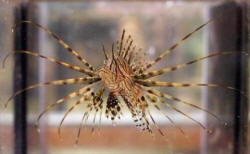|
 Florida
Lionfish ban, nation's first, goes into effect Florida
Lionfish ban, nation's first, goes into effect
 Send a link to a friend
Send a link to a friend
[August 02, 2014]
By Zachary Fagenson
MIAMI (Reuters) - Florida's ban on
importing invasive lionfish, the first of its kind in the nation, goes
into effect on Friday as wildlife managers look for a way to control the
spread of the barbed, red-and-white striped fish.
|
|
 Bringing the fish into the state is now punishable by a fine of up
to $1,000 and a year in prison. Bringing the fish into the state is now punishable by a fine of up
to $1,000 and a year in prison.
Lionfish, native to the waters off Southeast Asia, are believed to
have arrived in the region as pets for aquariums. Over time, some
were released into the wild.
The Florida Fish and Wildlife Conservation Commission, which
approved the ban in mid-June, also loosened fishing rules making it
easier for recreational divers and fisherman to catch lionfish.
Scientists are concerned that lionfish will decimate other species
found in Florida waters. The fish, which have few known predators,
live in warm waters up to 1,000 feet deep and feed on anything from
shrimp to other fish.

The loinfish, which can grow up to a foot in length, are covered in
poisonous spines. While they are not aggressive, they can flare the
barbs much like a porcupine if threatened.
"They're here to stay," said Roldan Muñoz, a researcher with the
National Oceanic and Atmospheric Administration in North Carolina
who studies the lionfish.
"If we can prevent more of them from getting dumped into the water
... as well as making it easier for people to harvest them it's a
good start," he said.
The first lionfish sighting was in 1985 off the coast of South
Florida, according to Pam Schofield, a fishery researcher for the
United State Geological Service (USGS).
[to top of second column] |

In the mid-1990s they began spreading up Florida's east coast and
can now be found year-round from the shores of Venezuela to North
Carolina.
Lionfish have been spotted on the U.S. East Coast as far north as
Rhode Island, but aren't able to survive in the frigid winter
waters.
A lionfish database operated by the USGS includes more than 4,000
sightings logged since 1985, though estimates of the total lionfish
population aren't available.
In September, the Fish and Wildlife Conservation Commission will
consider additional punishment for breeding lionfish.
(Editing by Frank McGurty and Sandra Maler)
[© 2014 Thomson Reuters. All rights
reserved.] Copyright 2014 Reuters. All rights reserved. This material may not be published,
broadcast, rewritten or redistributed.

 |